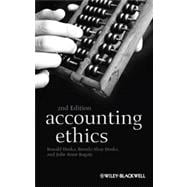
| Acknowledgments | p. x |
| Preface | p. xii |
| Introduction | p. 1 |
| The Nature of Accounting and the Chief Ethical Difficulty: True Disclosure | p. 9 |
| The Nature of Accounting | p. 10 |
| Ethics of Disclosure | p. 14 |
| The Financial Statement | p. 17 |
| Roles an Accountant can Fulfill | p. 20 |
| Development of Explicit Accounting Standards and Regulations | p. 22 |
| The Sarbanes-Oxley Act (SOX) | p. 27 |
| Recent Scandals that Provoked More Regulation | p. 29 |
| Conclusions | p. 30 |
| Ethical Behavior in Accounting: What Is Ethics? | p. 31 |
| What Is Ethics? | p. 34 |
| Ethics: The Intellectual Enterprise | p. 35 |
| Actions | p. 35 |
| Social Practices, Institutions, and Systems | p. 36 |
| Why Study Ethics? | p. 36 |
| Being Ethical: How to Determine What to Do | p. 38 |
| Questions to Ask to Justify an Action: The Basis of Ethical Theory | p. 42 |
| Using the Reasons | p. 46 |
| Ethical Dilemmas | p. 47 |
| Some Classic Moral Dilemmas | p. 48 |
| Ethical Behavior in Accounting: Ethical Theory | p. 51 |
| Egoism | p. 52 |
| Utilitarianism | p. 57 |
| Kant and Deontology | p. 61 |
| Deontological Ethics | p. 62 |
| The First Formula of the Categorical Imperative | p. 64 |
| The Second Formula of the Categorical Imperative | p. 65 |
| Virtue Ethics | p. 66 |
| Accounting as a Profession: Characteristics of a Profession | p. 69 |
| Accounting Codes of Conduct | p. 77 |
| AICPA Professional Code of Conduct | p. 79 |
| Code Principles | p. 80 |
| Criticisms of the Code of Conduct | p. 92 |
| The Rules of the Code of Conduct | p. 93 |
| Section 100 - Independence, Integrity, and Objectivity | p. 94 |
| Section 200 - General Standards Accounting Principles | p. 99 |
| Section 300 - Responsibilities to Clients | p. 102 |
| Section 400 - Responsibilities to Colleagues | p. 103 |
| Section 500 - Other Responsibilities and Practices | p. 103 |
| The Auditing Function | p. 109 |
| The Ethics of Public Accounting | p. 113 |
| Trust | p. 115 |
| The Auditor's Responsibility to the Public | p. 116 |
| The Auditor's Basic Responsibilities | p. 118 |
| Independence | p. 122 |
| Independence Risk | p. 127 |
| Professional Skepticisrn | p. 131 |
| Reasonable Assurance | p. 133 |
| The Ethics of Managerial Accounting | p. 135 |
| Reasons Used to Justify Unethical Behaviors | p. 140 |
| Blowing the Whistle | p. 144 |
| The Ethics of Tax Accounting | p. 151 |
| Ethics Applied to the Accounting Firm | p. 167 |
| Accounting as a Business | p. 169 |
| The Social Responsibility of Business | p. 170 |
| Good Ethics is Good Business | p. 175 |
| Ethical Responsibilities of Accounting Firms | p. 177 |
| The Accounting Profession in Crisis | p. 177 |
| Afterword: Current Debates on Accounting Issues | p. 185 |
| Fair Value and Principles vs. Rules | p. 185 |
| Fair Value Accounting | p. 189 |
| Arguments for and Against the Fair Value Approach | p. 193 |
| Summary | p. 198 |
| Principles vs. Rules | p. 199 |
| Introduction | p. 199 |
| Isn't GAAP Already Principles Based? | p. 200 |
| An Example: The Continental Vending Case | p. 204 |
| Recent Developments of ôPresent Fairlyö | p. 206 |
| A Better Question | p. 207 |
| Argument for a Rules Based Approach | p. 208 |
| What Would a Principles Based Approach Look Like? The True and Fair Override | p. 211 |
| Argument for a Principles Based Approach | p. 212 |
| Conclusion | p. 215 |
| Summary of Sarbanes-Oxley Act of 2002 | p. 217 |
| The IMA Code of Conduct for Management Accountants | p. 230 |
| Index | p. 233 |
| Table of Contents provided by Ingram. All Rights Reserved. |
The New copy of this book will include any supplemental materials advertised. Please check the title of the book to determine if it should include any access cards, study guides, lab manuals, CDs, etc.
The Used, Rental and eBook copies of this book are not guaranteed to include any supplemental materials. Typically, only the book itself is included. This is true even if the title states it includes any access cards, study guides, lab manuals, CDs, etc.